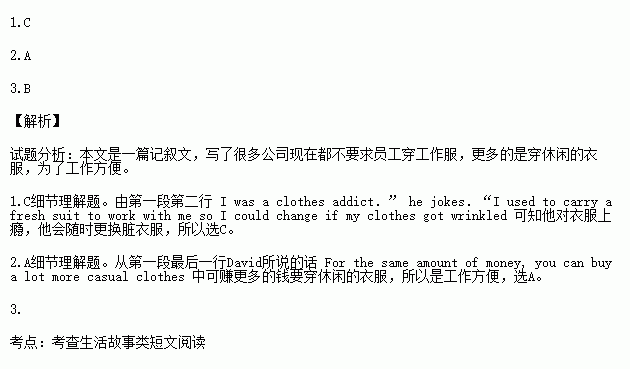题目内容
Five years ago, David Smith wore an expensive suit to work every day.“I was a clothes addict.” he jokes.“I used to carry a fresh suit to work with me so I could change if my clothes got wrinkled.” Today David wears casual clothes—khaki pants and a sports shirt—to the office.He hardly ever wears a necktie.“I am working harder than ever.” David says, “and I need to feel comfortable.”
More and more companies are allowing their office workers to wear casual clothes to work.In the United States, the change from formal to casual office wear has been gradual.In the early 1990s, many companies allowed their employees to wear casual clothes on Friday(but only on Friday).This became known as “dress-down Friday” or “casual Friday”.“What started out as an extra one-day-a-week benefit for employees has really become an everyday thing.” said business consultant Maisly Jones.
Why have so many companies started allowing their employees to wear casual clothes? One reason is that it’s easier for a company to attract new employees if it has a casual dress code.” “A lot of young people don’t want to dress up for work,” says the owner of a software company, “so it’s hard to hire people if you have a conservative(保守的)dress code.” Another reason is that people seem happier and more productive when they are wearing comfortable clothes.In a study conducted by Levi Strauss and Company, 85 percent of employers said that they believe that casual dress improves employee morale(心境,士气).Only 4 percent of employers said that casual dress has a negative influence on productivity.Supporters of casual office wear also argue that a casual dress code helps them save money.“Suits are expensive, if you have to wear one every day,” one person said.“For the same amount of money, you can buy a lot more casual clothes.”
1.David Smith refers to himself as having been “a clothes addict,” because ________.
A.he often wore khaki pants and a sports shirt
B.he couldn’t stand a clean appearance
C.he wanted his clothes to look neat all the time
D.he didn’t want to spend much money on clothes
2.David Smith wears casual clothes now, because__________.
A.they make him feel at ease when working
B.he cannot afford to buy expensive clothes
C.he looks handsome in casual clothes
D.he no longer works for any company
3.In this passage, the following advantages of casual office wear are mentioned EXCEPT __________.
A.saving employees’ money
B.making employees more attractive
C.improving employees’ motivation
D.making employees happier
 中考利剑中考试卷汇编系列答案
中考利剑中考试卷汇编系列答案 教育世家状元卷系列答案
教育世家状元卷系列答案 黄冈课堂作业本系列答案
黄冈课堂作业本系列答案 单元加期末复习先锋大考卷系列答案
单元加期末复习先锋大考卷系列答案
